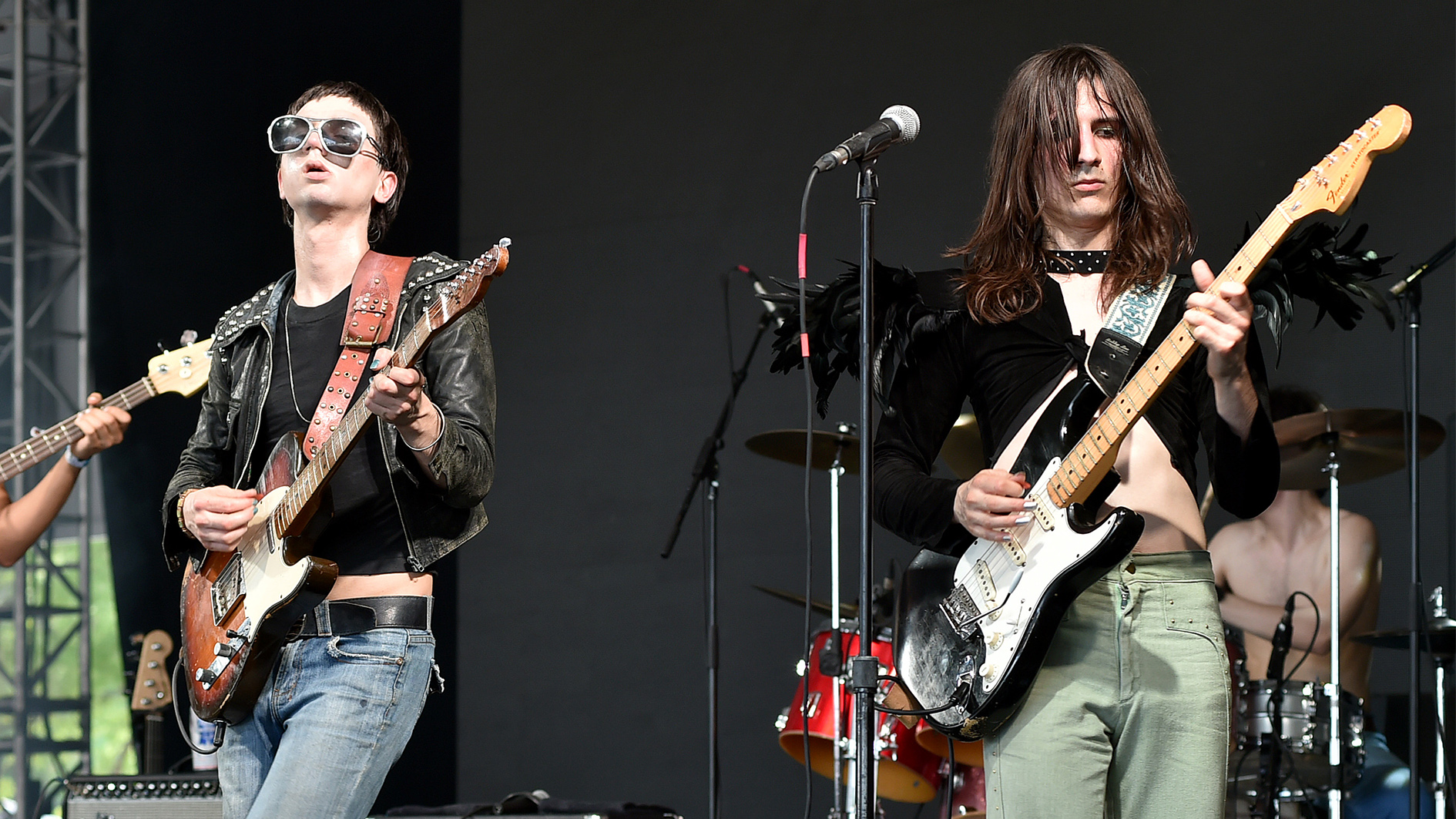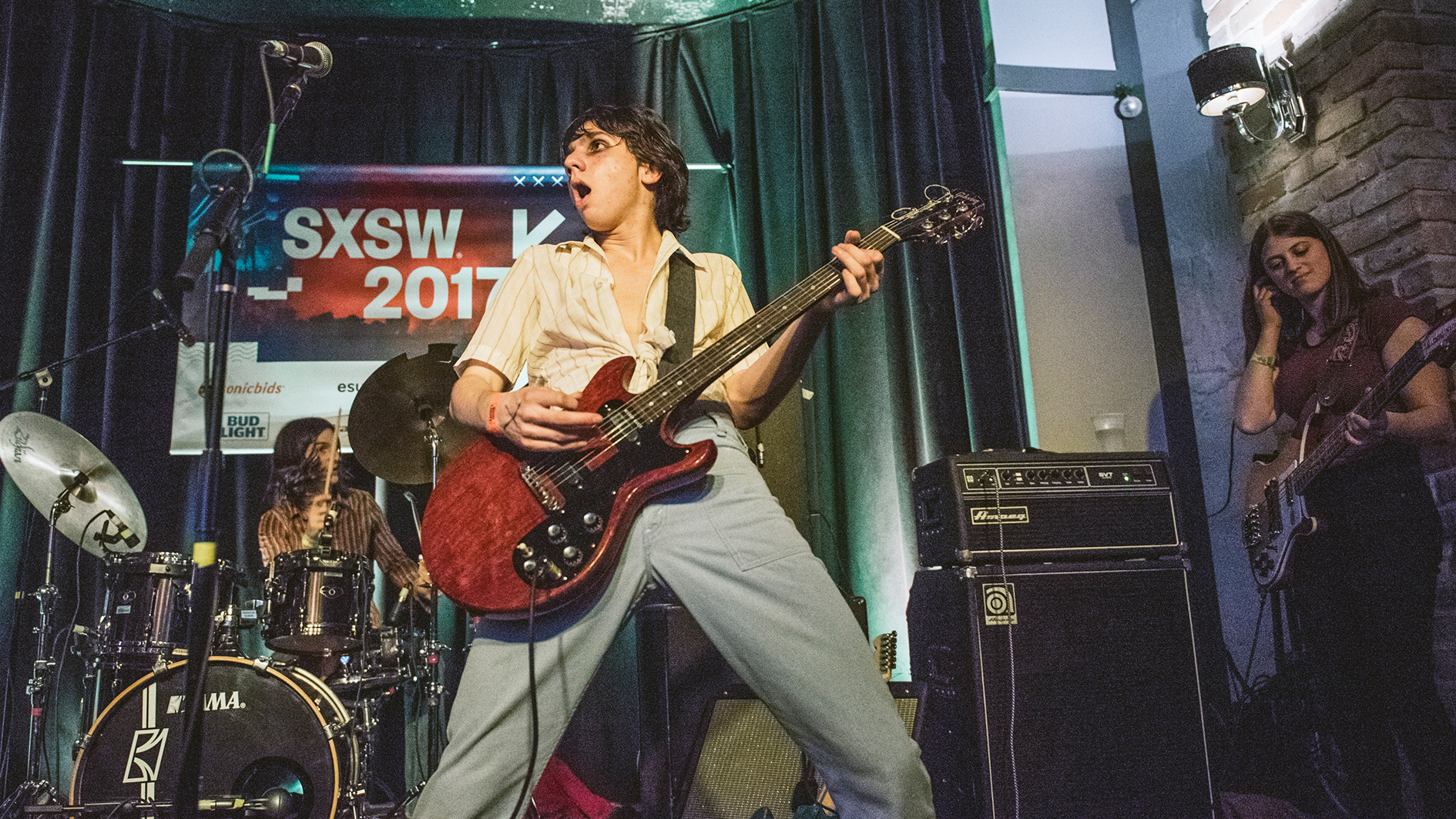The Lemon Twigs: "We have nothing against recording digital - but rock music probably shouldn't be done that way"
The Long Island D'Addario brothers on their individual writing styles, suffering from gear acquisition syndrome and masterful new album, Songs For The General Public

The multi-instrumentalist brothers behind Long Island’s The Lemon Twigs, Brian and Michael D’Addario, look and sound like rockstars in the original sense of the term.
We’re talking about the time when making this music was the preserve of outcasts and weirdos who couldn’t find a home anywhere else. And we mean this as the deepest of compliments.
Their first record, Do Hollywood, established them as a force for good, capable of combining droll humor and a deep knowledge of rock’s '70s visionaries into something somehow fun, contemporary and gritty.
Second effort, 2018’s Go To School, was produced from their Long Island home studio and saw the duo create a 16-track concept record about a chimpanzee raised as a human.
Now they’re back with Songs For The General Public - a cocky affirmation of what many suspected from the start: that if The Lemon Twigs choose to, they can outgun just about any of their contemporaries.
Pulling in the good end of '70s-era Beach Boys, Big Star and Todd Rundgren, with tasty guitar work from both D’Addarios (check out Leather Together and The One), they are at their most entertaining, melodic and masterful. Pushed back from a May release due to the pandemic, it’s now due to land on 21 August.
We spoke to the differing personalities that are Michael and Brian - separately, as per their preference, and edited together for your ease here - to discuss their differing approaches to lead work, the merits of Mockingbirds and how they moved on from the monkey business...
Get The Pick Newsletter
All the latest guitar news, interviews, lessons, reviews, deals and more, direct to your inbox!
The pandemic has had a disastrous impact on musicians, but in some ways it seems you’ve got a fairly unique advantage in that you still live together and you have the home studio as well. Have you been making the most of that?
Michael: “I think so, but we’ve always been - whether or not our productivity reflects that in terms of what has come out – we’ve always been always working. We’ve always had equipment, we’ve always bought equipment with whatever money is given to us, instead of going to studios, so that we could have the option to record whenever we wanted, so if we ever get even the slightest inkling to record something, we do it.”
We are recording stuff, but there’s been a lot of realizing that we’re going to have to re-record something because the sounds aren’t up to our standards
Brian D’Addario
Brian: “Yes. But, with the new record, there was a lot of utilizing other studios and trying to utilize better gear, compared with the second album that we did, where we used everything that’s currently at our house and nothing more.
"Now that we’ve done that, we can’t really settle with just what we have at the house right now. So we are recording stuff, but there’s been a lot of realizing that we’re going to have to re-record something because the sounds aren’t up to our standards at this point.”
Yeah, I guess you must feel somewhat vindicated by that kind of decision making - investing in your own equipment - at this point.
Michael: “Yeah, that’s all I’m thinking about.”
I think we can all agree that will be most people’s key take-away from the pandemic...
Michael: “Right. A lot of people are saying this is about my studio.”

Go To School was such a big idea and, as discussed, you recorded it at home, too - so nothing was off the table, really. What was left to do on Songs For The General Public?
Michael: “Well, you know, we’re insane people, so you have the idea that we threw off whatever shackles… But [On Go To School] we gave ourselves shackles. We gave ourselves very close criteria that we had to follow and we couldn’t break if it didn’t have to do with this concept - and why would you ever limit yourself to that?
"We were just kids, so I try not to put myself down - people tell me not to put myself down - but this record [in contrast] was to me what you would call a ‘free-for-all’, because we had no limits. I mean, we didn’t start something and then it had to fit the description.
We did it, whatever description it fit, which is probably the way it should be
Michael D'Addario
"We did it, whatever description it fit, which is probably the way it should be.“
Brian: “I think the main thing was tackling the most straightforward songs that we have. It was like every song had a very direct energy... sort of like setting an instant mood in the world of each song.
"I guess, once Go To School had been out for a while, we definitely felt like it, sonically, was in one place. This album has a much wider range of frequencies and it feels a lot more full. That was something that we definitely did on purpose.”
There is a lot of mention in your features and interviews about how you separate writing responsibilities. Has that changed?
Brian: “Not too much. There’s a lot more checking in with each other that happened on this album - making sure that whoever is working most on the track is doing the right thing at the time.
"I think we were both really in on every part of the process at the same time whereas I think, with the last record, there was a lot of, ‘Okay, I did my bit on this song - now I’m going to leave and you’re gonna take over.’
"Usually it’s an instrument or two instruments, if it’s not my song, that I play on his song and vice versa, but now it feels more collaborative. I think that’s the direction we tend to go after each record; it’s a little bit more collaborative bit by bit.”
Michael: “I get a lot of help from him, if I need some, or if I want to make it more interesting melodically or something like this, or know about the structure. I want to say, ‘Does this feel like at this point you would have turned it off?’
"I don’t really care [about most people’s opinion] but if he would have turned it off, that’s the question, not if ‘somebody’ would have. So I think that is writing together because, to me, holding somebody else’s opinion above all, that is a position that not everybody has... We’re each other’s editors.”
If there were certain songs where it was going to be really textural, almost like studio-musician kind of playing, he would have me play it
Brian D'Addario
How would you describe your respective guitar styles?
Brian: “Well, I guess it’s pretty different. Leather Together showcases Michael’s guitar style really well. There’s a lot of really spontaneous soloing and a lot of two guitars soloing at the same time. I think he has more of an Alex Chilton-style.
"[Whereas], if there were certain songs where it was going to be really textural, almost like studio-musician kind of playing, he would have me play it.
“Then on my recordings, I generally don’t play too much improvised guitar. A song like The One, a lot of my soloing came out of improvisations over the song, but it was like a part that was discovered and attempted to be executed a couple of times, whereas I think when Michael does a solo it’s generally improvised.”

Michael: “The first song on the album - Hell on Wheels - that’s me playing the guitar and then the last song on the album - Ashamed - there’s a lot of EBow going on and all the EBow is Brian and then the feedback lead guitar comes in, and that’s me and the rhythm guitars are me.
"Then there’s Moon - that’s me on the lead guitar. My style is much more rockin’ and simple and I do a lot of pinch harmonics but the playing itself is very simple and that’s a good foil to itself.
"I like the idea that somebody took the time out to do the pinch harmonics but then they don’t do much fancy stuff… it’s almost suspicious or weird that it’s that limited sounding.”
So what were you using on this record, gear-wise? And what are your go-to pieces? We note the Flying V in the The One video...
I’ve never had a guitar that’s very, very easy to play
Michael D'Addario
Brian: “Yeah, I don't think the Flying V was actually used on the record. On that song, I used my ’77 black Strat and I used this Fender Supersonic amp, which has a bigger cab, with four speakers in it.
"Then we used this old Fender Bassman amp, mostly for bass. And I can’t remember what pedals we used… We typically get whatever kind of distortion by having the amp very, very loud.
"We also used a Vox AC30 for a lot of stuff, mostly the rhythm guitars. Live In Favour Of Tomorrow, all the guitars were on the AC30. We do have a Gretsch 12-string that we use for a lot of 12-string guitars, and... I’m just looking around the studio right now...
"We do have a Fender fretless bass from the 70s that’s kinda strange looking. I think it was repainted way after. It doesn’t really look like it’s from 1975.”
Michael: “I don’t really have ‘a thing’. I just got a Mockingbird, the BC Rich, an old one. It was real cheap because it was refinished. Somebody had fucked it up and then they sanded it down and got it back to what it was like before, so that thing I really like, but it’s almost a little too easy to play.
"I’ve never had a guitar like that that’s very, very easy to play, you know? But I learned how to tap when I got it because I’ve got a guitar that’s easy to play.”
I’m really intrigued to hear a Lemon Twigs song with guitar tapping...
Michael: “Well, I just wanted to learn how to do it because my favorite styles are very, very simple and the only complicated guy that I really like is Randy Rhoads, so I did want to be able to tap in case I wanted to record something, but that’s not all there is to it with him obviously.
“I’d like to have a huge Marshall stack but I don’t have that. I don’t have anything that I’m in love with or anything like this; a lot of the stuff I don’t really like that much.”
I think that’s just what happens when you buy a guitar, though. Once it’s in your possession…
Michael: “…you don’t like it any more…”
Brian sounds incredible on [the Strat]; he’s really locked into it
Michael D'Addario
Yeah, then it’s old news and you look at the next shiny thing that’s definitely going to make you a hero.
Michael: “That’s right, I’ve been looking at Rickenbackers now because I thought you know… But the Mockingbird I do really like. I had a Telecaster for a long time and that was a lot more of what I’m used to. I don’t like the way it looks though that much.
"It’s not that it doesn’t look good, but it’s not really fancy enough for me. I can’t play the Strat really, I really don’t sound good on it. Brian sounds incredible on it; he’s really locked into it, he really can get great sounds with just a Strat and an amp or something and really it’ll be full too, and I just always sound too thin.”

It’s feeling bleak for musicians lately, but what’s motivating you right now?
Brian: “There is still so much more to do and to work on - so many people to get into. And I think that’s sort of keeping me going.
"I never really got read to too much growing up, and there’s a lot of people that I’m getting into now that I’m really enjoying like Dylan Thomas - people that I’ve heard about for my whole life and it’s just a whole other side of the same thing.
"You can feel the same things that you’ve felt for music in writing, so that’s really exciting for me at the moment.”
I think Kate Bush said that; it’s one and the same - the songwriting and the sound
Michael D'Addario
Michael: “Me and Brian are really interested in making something really beautiful sounding at the moment. We have access to real beauty when it comes to the harmonies and just melodic sensibility and stuff, and we hadn’t really been as focused on that, and now we’re really focused on that, so this is what is exciting me: is ourselves.
“A lot of people who would do beautiful stuff are kind of square, so they have a square recording process and they record digital… And this is nothing against recording digital; but this rock music really probably shouldn’t be done this way.
"And this beautiful stuff, you have to be dedicated to get the sounds, it’s inseparable the process. I think Kate Bush said that; it’s one and the same - the songwriting and the sound.”
The Lemon Twigs new album Songs For The General Public is out 21 August, 2020 on 4AD.

Matt is Deputy Editor for GuitarWorld.com. Before that he spent 10 years as a freelance music journalist, interviewing artists for the likes of Total Guitar, Guitarist, Guitar World, MusicRadar, NME.com, DJ Mag and Electronic Sound. In 2020, he launched CreativeMoney.co.uk, which aims to share the ideas that make creative lifestyles more sustainable. He plays guitar, but should not be allowed near your delay pedals.
Weezer’s first show was opening for Keanu Reeves’ band Dogstar. Now the John Wick star is set to play a villain in the Buddy Holly hitmakers’ forthcoming mockumentary
“Even the thought that Clapton might have seen a few seconds of my video feels surreal. But I’m truly honored”: Eric Clapton names Japanese neo-soul guitarist as one to watch










